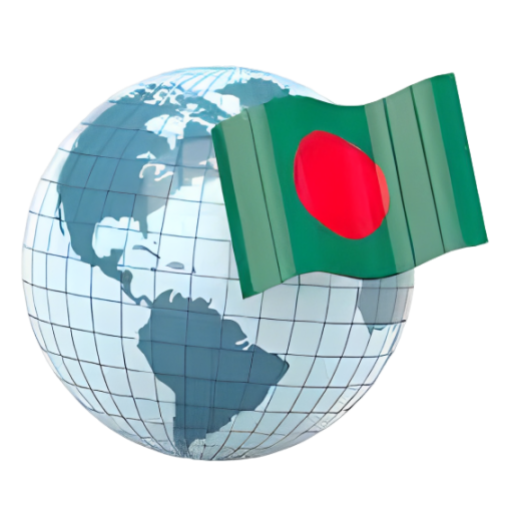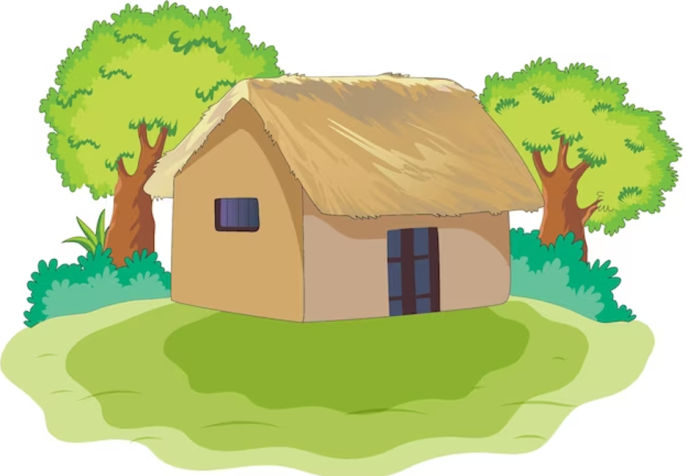The story behind the story
My wife Habiba and I recently attended a workshop for seniors titled ‘The Magic of Memoir’ at the Wesbrook Community Centre. Habiba is now working on her memoir, putting together her experience of growing up in Bangladesh and her Canadian journey. I completed a manuscript on my international development work in the form of ‘storytelling’ covering cultural and project experiences in different countries. I thought I was done with my memoir and there was nothing additional to write about me. So, when we signed up for the workshop, I did not know what to expect or how the workshop can tailor to my specific needs.
The workshop had a two-hour session every week over a four-week period. After the first session, I knew that the workshop was opening new vistas on the work I have already completed. The instructor gave homework to write in 750 words every week on topics like home, family, childhood memories etc. that forced me to reflect back and share my ideas with other participants. The experience was very powerful, engrossing – full of emotions and self-reflections that I never thought I would encounter in this workshop. I now think I have more to write and already thinking of another memoir. This story of the ‘elusive home’ is an expanded version of my ideas about home presented at the Magic of Memoir class.
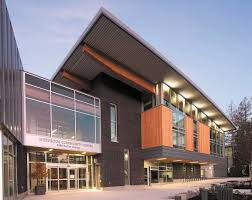
Wesbrook Community Centre, UBC Campus
What is home?
When I think of home, I always remember John Denver’s timeless song – ‘Country road take me home, To the place I belong, West Virginia… Mount Mama… Take me home.’ What a great song!
The song gives such an amazing feeling that can’t be explained in words. When you hear the song, you indeed feel and desire to ‘go home.’

What is home here? Is it a place? Is it the mountain? We can perhaps agree that this song is just not about people that left West Virginia only. It is about everyone that left behind their home, their family, friends, and their childhood. I am from Bangladesh, not West Virginia, but this song speaks directly to my heart. It is for anyone in the world who is ‘missing’ home. From this standpoint, is not home ‘elusive’ or to put it in another way, is not home an ‘imagination’?
Legendary folk singer John Denver (1943-1997)
In contrast, consider our own Canadian Michael Bublé’s song ‘I want to go home… alone in Paris and Rome…But I wanna to go home… still feel all alone… Oh, I miss you, you know…Let me go home.’ What is home here? Home is where the heart is. Home is where your ‘loved’ one is. Most of us perhaps would agree that home is where one lives permanently as a member of a family, where you begin your day and return to after work, where memories are made, and where one feels a sense of safety – we say ‘home, sweet home.’ Home gives you a sense of comfort and an environment that is welcoming. To some, an individual may epitomize a ‘home’ due to love, care, attention and security. Home is love, memories and being loved.
So, home is just not a place – it is beyond a location or residence that many writers, poets, mystics, gurus, celebrities, and everyday people have tried to define what it means to them. In sum, ‘home’ is a very loaded word that evokes emotional responses, with ever-evolving complexity and meaning. What matters, however, is that you feel ‘home’ when you are there. What an amazing feeling to be home!
What is home to me?
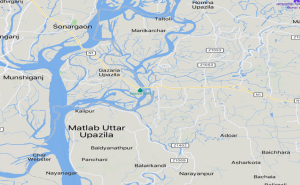
The very word ‘home’ reminds me of the village where I was born. Home is Kalipur, which is in Matlab North Upazila (subdistrict) where I spent my childhood. At that time, home meant a residence, a location or a space that provided the needed comfort. I felt my roots where I grew up and felt happy. I clearly remember the house we lived in, the kitchen where my mother cooked, the uthan or courtyard where we played, the baithak ghor or outer house where we used to study under the supervision of our lodging teachers, the elementary school, and the various fruit trees, including mango and jack fruit, around the house. The bazar or the local market on the bank of the Meghna River was a three-minute walk.
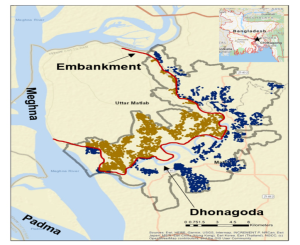
The geography of my village has completely changed since the construction of the Meghna-Dhonagoda flood control embankment in the early 1980s. The embankment was built as an effort to reduce the constant threat of floods in Matlab and to expand agricultural production, employment opportunities, communication, and health and social services, which the project did with reasonable successes.
Now, when I visit my village home, I don’t recognize it anymore. I don’t feel ‘being home’ because I don’t find any of my childhood memories. Things have changed and changed for better with modern infrastructure and amenities. The paved road, quality of housing and the way of life – all are much better now for those who live in the village. Do I belong there? No, that is not my home anymore. The village I grew up is long lost both in time and space. My ‘home’ is only in my imagination. And I see and can feel only when I close my eyes and remember my village home. It has been a long time that I left home for Canada – almost over four and a half decades. I am now 73 years and have not lived anywhere as long as I have lived in Canada.
Where is my home then?
Home is where you feel at ease, feel loved and perhaps it is where our future begins. Our homes are our memories and dreams, and a place of refuge for family members. Without a stable home, we can’t plan for future. Since 1980, I have lived across Canada in many places, often felt displaced and nomadic with temporary teaching positions every other year. Every time we moved into a new place with our two kids, we tried to make it ‘home.’ Did we feel homely? Not really. My memories of those places are all faded now. Of course, I feel ‘at home’ where I live now, because I feel loved and have enjoyed a stable and comfortable living over the past 28 years. It is a feeling from ‘within’ and you know when and where you feel ‘being home.’
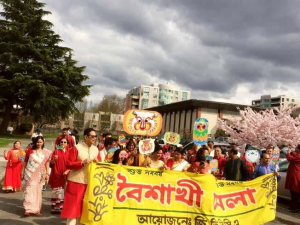
That said, I often feel I have many homes. Bangladesh and Canada aside, I have lived and worked in many countries as an international consultant working for various multilateral development banks. I felt ‘at home’ in many places – for example, places like Colombo, Delhi, Kolkata, Lahore, Islamabad, Jakarta, Manila, Phnom Penh, Nanjing and Nairobi, because I have very good friends and colleagues there that I still interact with and consider part of my extended family. You need friends to make it ‘at home.’ In the same vein, the sense of ‘home’ may be different with people who are diaspora – i.e., live in countries other than their own. What is then ‘home’ to diaspora community? This is not an easy question to answer. The Bangladeshi immigrants or for that matter any other people (who are not indigenous) living in Vancouver and other cities in Canada, may feel ‘at home’ where they live, but there is a big psychological difference between feeling ‘at home’ and ‘being home.’
The feeling ‘at home’ is simply a way of adapting to the new environment through experiences, networks, friendships and community-building to make it ‘like home.’ In this context, home means a future, and not ‘being home.’ For members of the diaspora, it is perhaps not easy to think of only one home. The desire to ‘go home’ always remains with immigrant people where ever they live. Many return ‘home’ in their old age to find soul age both socially and spiritually.
In Canada, some people have never left the one home they have always known through their life time. However, there are others – for example, many retirees and seniors are leaving ‘home’ for a new life on the road in recreational vehicles (RVs). They don’t live in any fixed locations that we call home; in reality, the RV is their full-time ‘home.’ They travel from place to place, often across borders to the U.S. and Mexico and beyond. They live and love a ‘carefree’ and ‘adventurous’ lifestyle for far less than you and I spend for life. They are on the move all the time and looking for home.
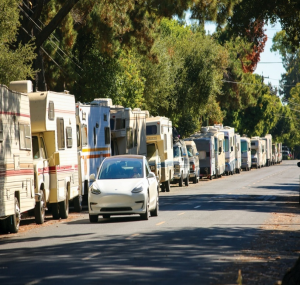
I am told that RVers on the road always play John Denver’s ‘Country road take me home, To the Place I belong…’ I am not surprised by that at all. It is very common with many people to re-discover home again and again, because everyone has a different idea about ‘home.’ The truth, however, is that there is no home once you leave behind your home. Many find imaginary and fictional ‘home in the air’ (ki ghor banaimu ami shunneri majhar – Hason Raja, 1854-1922). A ‘homeless’ mind indeed may reinvent many homes as a journey of experience over time.
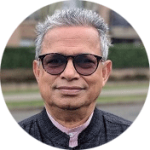
Mohammad Zaman
Dr. Mohammad Zaman is an internationally known development/ resettlement specialist. He has worked in many major projects for the World Bank in Bangladesh and in other countries in Asia and Africa. Dr. Zaman’s most recent edited book (co-editor Mustafa Alam) is titled Living on the Edge: Char Dwellers in Bangladesh, Springer, 2021. E-mail: mqzaman.bc@gmail.com
